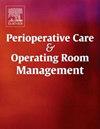Exploring the perceived impact of the National Audit Project 6 (NAP6) recommendations on practice within perioperative anaphylaxis: A qualitative study
IF 1
Q2 Nursing
Perioperative Care and Operating Room Management
Pub Date : 2025-07-16
DOI:10.1016/j.pcorm.2025.100528
引用次数: 0
Abstract
Background
Patient safety within perioperative care is significant due to the potential for major complications requiring a rapid response. The Royal College of Anaesthetists’ National Audit Projects (NAPs) have sought to improve patient safety by investigating serious and rare complications occurring during anaesthesia. The sixth NAP (NAP6), focused on perioperative anaphylaxis, and produced 134 recommendations. Staff perceptions of the impact of NAP6 recommendations have not been studied, which was the purpose of this research.
Methods
Semi-structured interviews were conducted with a purposive sample of 21 healthcare professionals across three teaching hospitals in England and with five stakeholders who could share a national perspective. A documentary analysis was conducted with departmental and institutional documents associated with the training for, and management of perioperative anaphylaxis.
Results
Examples of perceived impact included: raised awareness on the main culprits of perioperative anaphylaxis, and awareness to consider an event as anaphylaxis; changes in referrals of patients to allergy clinics; increased penicillin allergy de-labelling initiatives; better communication with healthcare professionals and patients; alerts to remind staff on recommended care; and updates to national guidelines. Limited access to allergy clinics; the need for further penicillin allergy de-labelling; the lack of accountability for implementing recommendations; misalignment between disciplines; difficulties removing incorrect allergy labels; and access to launch events were highlighted as areas for improvement in implementation. Whilst access to allergy clinics; good relationships with stakeholders in the field; hospitals engaged with quality improvement initiatives; and the perioperative allergy network were recognised as enablers to implementation.
Conclusions
Future areas for consideration based on the perspectives shared by interviewees include improving access to allergy testing, enhancing penicillin allergy de-labelling initiatives, and sharing guidance on how to implement the recommendations (including funding).
探索国家审计项目6 (NAP6)建议对围手术期过敏反应实践的感知影响:一项定性研究
背景:围手术期护理中的患者安全非常重要,因为可能出现需要快速反应的重大并发症。皇家麻醉师学院的国家审计项目(nap)通过调查麻醉过程中发生的严重和罕见的并发症,试图提高患者的安全性。第六次NAP (NAP6)侧重于围手术期过敏反应,并提出了134项建议。工作人员对NAP6建议影响的看法尚未进行研究,这正是本研究的目的。方法采用半结构化访谈的方法,对英格兰三所教学医院的21名医疗保健专业人员和五个可以分享国家观点的利益相关者进行了有目的的抽样调查。对与围手术期过敏反应培训和管理相关的部门和机构文件进行文献分析。结果感知影响的例子包括:提高了对围手术期过敏反应主要原因的认识,以及将某一事件视为过敏反应的认识;患者转介到过敏诊所的变化;增加青霉素过敏去除标签行动;加强与医护人员和病人的沟通;提醒员工注意建议的护理措施;以及国家指南的更新。前往过敏诊所的机会有限;进一步取消青霉素过敏标签的必要性;执行建议缺乏问责制;学科之间的错位;难以去除不正确的过敏标签;获得发射活动的机会被强调为执行方面有待改进的领域。同时获得过敏诊所;与该领域的利益相关者保持良好的关系;参与质量改进举措的医院;围手术期过敏网络被认为是实施的推动者。基于受访者分享的观点,未来需要考虑的领域包括改善过敏检测的可及性,加强青霉素过敏脱标举措,以及就如何实施建议(包括资金)分享指导意见。
本文章由计算机程序翻译,如有差异,请以英文原文为准。
求助全文
约1分钟内获得全文
求助全文
来源期刊

Perioperative Care and Operating Room Management
Nursing-Medical and Surgical Nursing
CiteScore
1.30
自引率
0.00%
发文量
52
审稿时长
56 days
期刊介绍:
The objective of this new online journal is to serve as a multidisciplinary, peer-reviewed source of information related to the administrative, economic, operational, safety, and quality aspects of the ambulatory and in-patient operating room and interventional procedural processes. The journal will provide high-quality information and research findings on operational and system-based approaches to ensure safe, coordinated, and high-value periprocedural care. With the current focus on value in health care it is essential that there is a venue for researchers to publish articles on quality improvement process initiatives, process flow modeling, information management, efficient design, cost improvement, use of novel technologies, and management.
 求助内容:
求助内容: 应助结果提醒方式:
应助结果提醒方式:


